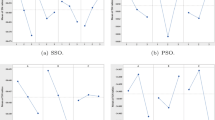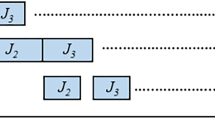Abstract
This article addresses the problem of scheduling hybrid flowshops where the setup times are sequence dependent to minimize makespan and maximum tardiness. To solve such an NP-hard problem, we introduce a novel simulated annealing (SA) with a new concept, called “Migration mechanism”, and a new operator, called “Giant leap”, to bolster the competitive performance of SA through striking a compromise between the lengths of neighborhood search structures. We hybridize the SA (HSA) with a simple local search to further equip our algorithm with a new strong tool to promote the quality of final solution of our proposed SA. We employ the Taguchi method as an optimization technique to extensively tune different parameters and operators of our algorithm. Taguchi orthogonal array analysis is specifically used to pick the best parameters for the optimum design process with the least number of experiments. We established a benchmark to draw an analogy between the performance of SA with other algorithms. Two basically different objective functions, minimization of makespan and maximum tardiness, are taken into consideration to evaluate the robustness and effectiveness of the proposed HSA. Furthermore, we explore the effects of the increase in the number of jobs on the performance of our algorithm to make sure it is effective in terms of both the acceptability of the solution quality and robustness. The excellence and strength of our HSA are concluded from all the results acquired in various circumstances.
Similar content being viewed by others
References
Zandieh M, Fatemi Ghomi SMT, Moattar Husseini SM (2006) An immune algorithm approach to hybrid flow shops scheduling with sequence-dependent setup times. Appl Math Comput 180:111–127, doi:10.1016/j.amc.2005.11.136
Baker KR (1974) Introduction to sequence and scheduling. Wiley, New York
Ruiz R, Maroto C (2006) A genetic algorithm for hybrid flowshops with sequence dependent setup times and machine eligibility. Eur J Oper Res 169:781–800, doi:10.1016/j.ejor.2004.06.038
Conway RW, Maxwell WL (1967) Theory of scheduling. Addison-Wesley, Boston
Sule DR (1997) Industrial scheduling. PWS, Boston
Luh PB, Gou L, Zhang Y, Nagahora T, Tsuji M, Yoneda K, Hasegawa T, Kyoya Y, Kano T (1998) Job shop scheduling with group dependent setups, finite buffers, and long time horizon. Annal Opns Res 76:233–259, doi:10.1023/A:1018948621875
Gupta JND (1988) Two-stage hybrid flowshop scheduling problem. J Oper Res Soc 39(4):359–364
Ng EYK, Ng EWK (2006) Parametric study of the biopotential equation for breast tumors identification using ANOVA and Taguchi method. Med Biol Eng Comput 44:131–139
Jungwattanakit J, Reodecha M, Chaovalitwongse P, Werner F (2007) Algorithms for flexible flow shop problems with unrelated parallel machines, setup times, and dual criteria. Int J Adv Manuf Technol, doi:10.1007/s00170-007-0977-0
Luo F, Sun H, Geng T, Qi N (2008) Application of Taguchi’s method in the optimization of bridging efficiency between confluent and fresh micro carriers in bead-to-bead transfer of Vero cells. Biotechnol Lett 30(4):645–649
Cheng BW, Chang CL (2007) A study on flowshop scheduling problem combining Taguchi experimental design and genetic algorithm. Expert Syst Appl 32:415–421, doi:10.1016/j.eswa.2005.12.002
Caprihan R, Wadhwa S (2005) Scheduling of FMSs with information delays: a simulation study. Int J Flex Manuf Syst 17:39–65, doi:10.1007/s10696-005-5993-5
Ruiz R, Allahverdi A (2007) Some effective heuristics for no-wait flowshops with setup times to minimize total completion time. Ann Oper Res 156:143–171, doi:10.1007/s10479-007-0227-8
Ruiz R, Stützle T (2008) An Iterated Greedy heuristic for the sequence dependent setup times flowshop problem with makespan and weighted tardiness objectives. Eur J Oper Res 187(3):1143–1159, doi:10.1016/j.ejor.2006.07.029
Johnson SM (1954) Optimal two and three-stage production schedules with setup times included. Nav Res Logist Q 1:61–67, doi:10.1002/nav.3800010110
Yoshida T, Hitomi K (1979) Optimal two-stage production with setup times separated. AIIE Trans 11:261–263
Gupta JND, Darrow WP (1986) The two-machine sequence dependent flow shop scheduling problem. Eur J Oper Res 24(3):439–446, doi:10.1016/0377-2217(86)90037-8
Kurz ME, Askin RG (2003) Comparing scheduling rules for flexible flow lines. Int J Prod Econ 85:371–388, doi:10.1016/S0925-5273(03)00123-3
Kurz ME, Askin RG (2004) Scheduling flexible flow lines with sequence-dependent setup times. Eur J Oper Res 159(1):66–82, doi:10.1016/S0377-2217(03)00401-6
Allahverdi A, Ng CT, Cheng TCE, Kovalyov YM (2008) A survey of scheduling problems with setup times or costs. Eur J Oper Res 187(3):985–1032, doi:10.1016/j.ejor.2006.06.060
Kim YD (1993) Heuristics for flow shop scheduling problems minimizing mean tardiness. J Oper Res Soc 44:19–28
Kim YD, Lim HG, Park MW (1996) Search heuristics for a flow shop scheduling problem in a printed circuit board assembly process. Eur J Oper Res 91:124–143, doi:10.1016/0377-2217(95)00119-0
Phadke MS (1989) Quality engineering using robust design. Prentice-Hall, Upper Saddle River
Adenso-Díaz B (1996) An SA/TS mixture algorithm for the scheduling tardiness problem. Eur J Oper Res 88:516–524, doi:10.1016/0377-2217(94)00213-4
Vallada E, Ruiz R, Minella G (2008) Minimizing total tardiness in the m-machine flowshop problem: a review and evaluation of heuristics and metaheuristics. Comput Oper Res 35(4):1350–1373, doi:10.1016/j.cor.2006.08.016
Norman BA, Bean JC (1999) A genetic algorithm methodology for complex scheduling problems. Nav Res Logist 46:199–211, doi:10.1002/(SICI)1520-6750(199903)46:2<199::AID-NAV5>3.0.CO;2-L
Jin Z, Yang Z, Ito T (2006) Metaheuristic algorithms for the multistage hybrid flowshop scheduling problem. Int J Prod Econ 100:322–334, doi:10.1016/j.ijpe.2004.12.025
Montgomery DC (2000) Design and analysis of experiments, 5th edn. Wiley, New York
Ruiz R, Maroto C, Alcaraz J (2006) Two new robust genetic algorithms for the flowshop scheduling problem. Omega 34:461–476, doi:10.1016/j.omega.2004.12.006
Ruiz R, Stützle T (2007) A simple and effective iterated greedy algorithm for the permutation flowshop scheduling problem. Eur J Oper Res 177:2033–2049, doi:10.1016/j.ejor.2005.12.009
Cochran WG, Cox GM (1992) Experimental designs, 2nd edn. Wiley, New York
Ross RJ (1989) Taguchi techniques for quality engineering. McGraw-Hill, New York
Lundy M, Mees A (1986) Convergence of an annealing algorithm. Math Program 34:111–124, doi:10.1007/BF01582166
Hmida AB, Huguet MJ, Lopez P, Haouari M (2007) Climbing depth-bounded discrepancy search for solving hybrid flow shop problems. Eur J Ind Eng 1(2):223–240, doi:10.1504/EJIE.2007.014110
Valente JMS (2007) Heuristics for the single machine scheduling problem with early and quadratic tardy penalties. Eur J Ind Eng 1(4):431–448, doi:10.1504/EJIE.2007.015391
Li X, Ye N, Xu X, Sawhey R (2007) Influencing factors of job waiting time variance on a single machine. Eur J Ind Eng 1(1):56–73, doi:10.1504/EJIE.2007.012654
Rodriguez-Tello E, Hao JK, Torres-Jimenes J (2008) An effective two-stage simulated annealing algorithm for the minimum arrangement problem. Comp Oper Res 35(10):3331–3346, doi:10.1016/j.cor.2007.03.001
Wu TH, Chang CC, Chung SH (2008) A simulated annealing algorithm for manufacturing cell formation problems. Expert Syst Appl 34(3):1609–1617, doi:10.1016/j.eswa.2007.01.012
Ramesh S, Teegavarapu V, Simonovic SP (2002) Optimal operation of reservoir systems using simulated annealing. Water Resour Manag 16(5):401–428, doi:10.1023/A:1021993222371
Author information
Authors and Affiliations
Corresponding author
Rights and permissions
About this article
Cite this article
Naderi, B., Zandieh, M. & Roshanaei, V. Scheduling hybrid flowshops with sequence dependent setup times to minimize makespan and maximum tardiness. Int J Adv Manuf Technol 41, 1186–1198 (2009). https://doi.org/10.1007/s00170-008-1569-3
Received:
Accepted:
Published:
Issue Date:
DOI: https://doi.org/10.1007/s00170-008-1569-3




